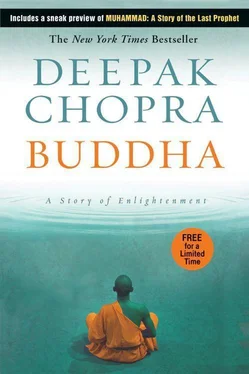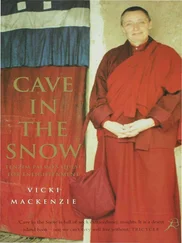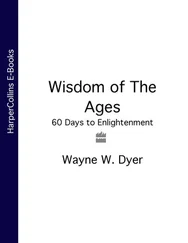The monks knew that Buddha did not make casual remarks. His every utterance was dedicated to teaching them the truth. Very soon the noise of battle grew loud enough that they could hear steel striking against steel and the anguished cries of dying soldiers. Buddha stopped and listened. “Words of peace fooled my father. Devadatta has tricked him into war.” Then he pointed away from the conflict. “Home first.” An hour later they saw the towers of the gates to the capital city. The road widened, and the last hundred yards were paved with cobblestones.
“Who’s there?” a sentry cried.
“One you called Siddhartha,” said Buddha.
“I can’t let anyone in who isn’t a citizen, and I don’t know that name,” said the sentry, peering through a slot above them. He was young, almost a boy. The real soldiers were all away to do the king’s killing.
“Send for Princess Yashodhara’s maid. She will recognize me,” said Buddha. The sentry’s face vanished from the top of the gate. They waited, then the great wooden gates opened just wide enough to admit them and the stallion. Buddha saw where his wife was. Having heard the name Siddhartha, she sent her maid scurrying to the gates while she hurriedly examined herself in the mirror and wrapped herself in a sari threaded with gold.
She was panting and sweating slightly when she seated herself in the gazebo. Rahula was taking a nap, and Yashodhara almost woke him up, but she didn’t want him to see her weep uncontrollably, so she came alone. The wind was light, but whenever it turned slightly she could faintly catch the sounds of war, which increased her anxiety.
“My dear.”
She had been so distracted that he was there before she heard him. With a cry, Yashodhara jumped to her feet, ran to Buddha, and threw her arms around him. She was sensitive to his slightest response, and her heart swelled when she felt his arms hold her without hesitation. This came as such an enormous relief that she began to sob. A husband would have said, “There’s no cause for that. I’m home now. It’s all right.” Yashodhara’s husband said none of those things.
Buddha let go of her, and for an instant Yashodhara felt completely abandoned. She wanted to clutch at him, but he raised a finger in a small gesture, and her arms fell to her sides. “You are my beloved wife. It’s your right to embrace me,” said Buddha. “No one shall ever do that again. Not even you.”
Yashodhara trembled. She had spent years blocking out of her mind any image of Siddhartha as a monk. Even at that moment she kept her eyes fixed on his face, refusing to see his saffron robes. His features began swimming before her, but she wasn’t fainting-no black curtain descending over her eyes, no cold sweat and chill moving up toward her head. Instead, Yashodhara felt warm, and the warmth began in her heart. It radiated outward. What was happening to her? The world disappeared from sight, not in blackness but in the glow of a white light that had no source. She caught one last glimpse of the sun, but it was pale compared to the light that now filled up her whole being. Now she was certain that the light came from this man who used to be her husband.
“This is your time, Yashodhara. Surrender and be free.”
Buddha didn’t spend the night in Kapilavastu but took the five monks and headed for the battlefield. It was near sunset when they arrived at a hilltop overlooking the fighting. In the waning light neither side was leading a charge. Elephants and horses had been pulled back from the front. All that remained of the din of war was the clash of swords. Foot soldiers fought in bands with the enemy, raising dust around them.
Buddha sat down on the ridge. From above, every soldier was like a frantic puppet flailing away. Some puppets ran around, bumping into other puppets. They bounced off each other, then one would fall and not get up again. Many puppets littered the field, some writhing a little, others very still.
“Are we going down there?” Kondana asked nervously. “What place is it for monks?”
“We have no other choice,” said Buddha. “War is no different from what happens every day. It’s another way that men have found to suffer.”
“But life isn’t always a war,” Kondana pointed out.
“Not openly,” said Buddha. “But if men weren’t so afraid of dying, they would fight every day, and in their hearts their dearest wish would be to see every enemy destroyed.” By now the light had faded, ending the skirmishes on the field. The last thing one could see were the scavengers who crept onto the scene to loot dead bodies. The wind carried sweet birdcalls up the hill, mixed with moans of wounded soldiers.
“Master, what you’re saying is very dark. It makes the situation hopeless,” said Kondana.
“Hope never ended a war.”
That was Buddha’s last word for the night. He folded his robes around him and lay on the ground. The five monks had learned that he had no concern for where he slept or who was nearby. But they had gotten into the habit of seeing after his comforts to the small extent he would allow. They fetched a gourd of water to place by his side and some food brought from the capital. They built a fire and together lay down apart from him out of respect.
Buddha usually urged them to sleep nearby, but they might have been worried to see that he needed no sleep anymore. He rested his body, but his mind remained awake all the time. Now he sent a blessing to Yashodhara and visited his six-year-old son, Rahula, who could hardly stay in bed with the excitement of once more having a father. The boy had been raised to believe secretly that Siddhartha was still alive, so he wasn’t as wonder-struck as the courtiers who set eyes on Buddha. Buddha repeatedly told them that he hadn’t come home to assume the throne, but many kept hoping he would do so.
When the sun rose and all the monks were awake, Buddha pointed to the scene down below, where clusters of soldiers stirred around their campfires. Some ate hurriedly, but most were tending to their horses, sharpening their swords, and repairing ripped leather armor.
“How many will die?” asked Assaji soberly.
“All of them, if not today then one day,” said Buddha curtly. The monks had never heard a heartless remark from their master, and this astonished them. His voice softened. “I told you that the first fact of the world is suffering. We can end suffering, but not by speaking of God.” Buddha’s arm swept across the entire battlefield. “Which of these fighters doesn’t believe that God is on his side?”
“But God relieves suffering too,” said Assaji.
“Never promise such a thing,” said Buddha, shaking his head. “All this religious talk has nothing to do with us. I will tell you how to consider any person you meet. Look on them as being like a man whose house has caught on fire. Would such a man cry, ‘I’m not leaving until someone tells me why God made this happen’? No. He runs out of a burning house as fast as he can. The same is true of suffering. We must show people how to run away from it as fast as they can. It’s no use spending years discussing whether someone is cursed or loved by the gods.”
The closest fighting was no more than a quarter mile away, and they reached it in a few minutes. One horseman had chased another away from the center of battle. He had gotten close enough to thrust a spear into his enemy’s mount, which had stumbled and thrown its rider. Now both soldiers were on their feet fighting hand-to-hand; they both were experienced enough to use a dagger in one hand and a sword in the other.
As they walked closer, the monks attracted no attention-the two soldiers were blind to everything but their struggle. Even so, the five monks were shaken at the sight of violence. Buddha stopped for a moment to let them regain their nerve.
Читать дальше












